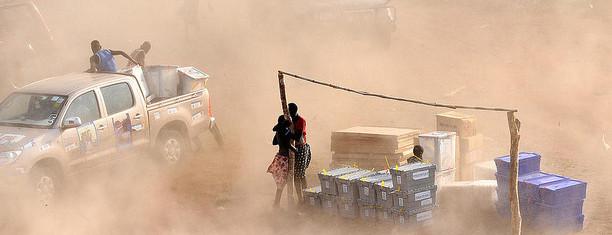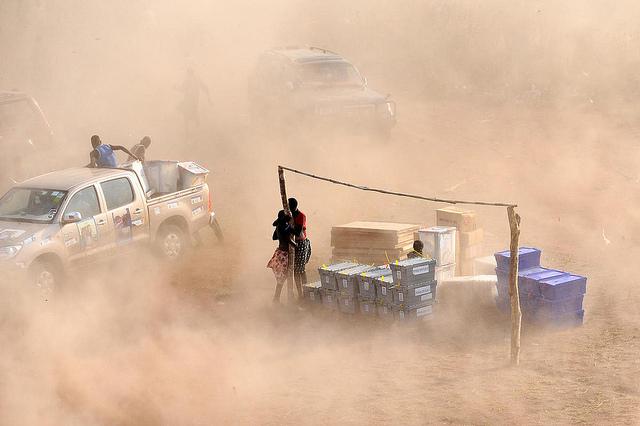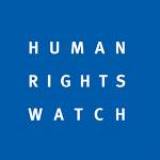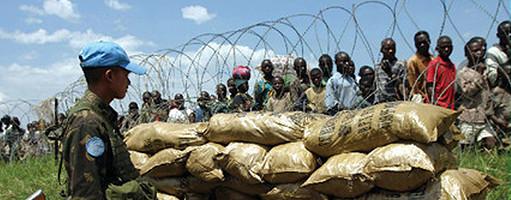South Sudan: Why a political crackdown accompanies a peace agreement

President Salva Kiir is not a good leader, but bad international policies can compel him to become a worse one.

Dust swirls as a UN helicopter takes off in Tali Payam, South Sudan. Photograph by UN Photo/Tim McKulka.
It’s no coincidence that South Sudan’s President Salva Kiir cracked down hard on dissent at precisely the same moment he reluctantly signed the “˜Compromise Peace Agreement’ – a deal that should, ostensibly, bring an end to the last 20 months of fighting with the SPLA In Opposition (SPLA-iO) forces. This also reveals why the tools of targeted financial sanctions, newly fashionable in Washington DC, must be used with extreme caution lest they worsen the situation they are supposed to redress.
The basic facts are these. On 27 August, under severe pressure from the IGAD (Intergovernmental Authority on Development) mediators and their backers, notably the US, President Salva signed the Compromise Peace Agreement. Riek Machar, leader of the SPLM-iO, had seen the writing on the wall earlier and had signed ten days previously. Salva came to the signing ceremony with an extensive list of reservations, which the mediators promptly and somewhat insultingly announced they would disregard.
During these same days, Salva dismissed three governors and cracked down on Equatorian political opponents. The Equatorian leader Peter Abdelrahman Sule was killed, with suspicions falling on collusion between the Ugandan and South Sudanese intelligence services. There are daily reports of disappearances. Salva himself threatened journalists who did not support the government line. A journalist, Peter Moi Julius, was killed days later.
The events are connected. According to the political-commercial logic of the political marketplace, peace – an end to violent hostilities between belligerents – is a bargain to share out power and resources. There are basically two routes to such an agreement: either the belligerents engineer a buyout, or their financiers do so. The result is as durable as the conditions in the marketplace.
A good example of a belligerents’ buyout is the 2006 Juba Declaration whereby Salva Kiir was able to bring dissident southern Sudanese militia commanders into an expanded SPLA, and their political leaders into the SPLM and the Government of Southern Sudan. It was possible because oil revenues meant that there was enough money to satisfy all. It lasted for as long as the money flowed: when the funds stopped, the deal fell apart.
Today, if South Sudan’s oil production were increasing and the oil price were high, it might have been possible for a similar bargain to have been struck. Unfortunately, South Sudan’s economic crisis means that Salva simply doesn’t have the funds to attempt anything comparable. All his available political budget is devoted to maintaining a narrow power base. For a buyout peace, Salva needs a lot more money. South Sudan’s donors want peace but they don’t want to funnel their money into Salva’s personal bank account, so they’re not supporting this well-established route to peace.
Financiers can impose a political austerity package on belligerents if they have the clout. This is what happened in Somaliland in 1992-93: the businessmen who controlled the livestock trade and remittances compelled the factional leaders to negotiate a peace deal. They could do this because the factional leaders relied on them for money, and because the businessmen could, if they so wished, circumvent the politicians and deal directly with military commanders. In Somaliland, this was the foundation for a transformational process of building accountable government. South Sudan’s donors have floated ideas of putting the oil revenues under independent management, but they haven’t done it, and still less have they worked out how to turn that money into political finance for peace.
So, neither of the marketplace routes to peace exists today in South Sudan. The current Compromise Peace Agreement in South Sudan was drafted and imposed by the “˜IGAD Plus’ group of mediators. They used tools of financial coercion – threats of sanctions including individually targeted sanctions – to press the belligerents into signing an agreement. Implementing the agreement requires political will and political means. But neither the tools nor the agreement address the question of what the belligerent leaders need for political survival. If anything, targeting illicit financial activities makes the leaders’ predicament worse. How are Salva or Riek to maintain their political bases without an expanded political budget? Their lieutenants are not suddenly going to start demanding a lower price for allegiance, just because their patrons are cash-strapped or have signed a peace deal.
With a tightened political budget, the only way for a leader to stay in position is to narrow his political base. Hence Salva must reward his closest circle of supporters (who are his most immediate threats), which means discarding others. He must shift from buyout to coercion. That is why an international squeeze on political payments may cause Salva to increase repression. He will do this because it is demanded by the logic of survival. Salva’s not a good leader, but bad international policies can compel him to become a worse one.
Tackling South Sudan’s pathological political economy requires different ways of organising political finance and controlling violence. Targeted sanctions cannot do this: they are tactical tools that shape incentives at the margin and cannot even compel political elites to hold a ceasefire for more than a few days, let alone promote any kind of transformation of South Sudanese politics. Nor is there a trade-off between democracy and peace – the short-term political reconfiguration in South Sudan will deliver on neither.
International policymakers may find sanctions appealing because they punish individuals who have misbehaved and give the impression of doing something right. But those who advocate targeted sanctions should correctly analyse their context and be aware of other consequences they may have. Those consequences may be deadly, as South Sudanese are discovering.
Alex de Waal is director of the World Peace Foundation.







Indeed, the latest Addis peace deal that president Kiir with reservations is ‘a short-term political configuration’ that won’t bring lasting peace.
Whatever the fatal outcome expected by most South Sudanese of this doomed peace deal, incumbent president Kiir will be the main cause.
Only solution is the forceful removal of Kiir from the equation…. of course with the collaboration of the international community …… a peaceful resolution will come thereafter.
Leadership is not born or acquired as it is being seen in south Sudan and worst in the Dinka lead government of south Sudan. A leader with better idea, innovation and future goals for his country will lead his people toward change, success and prosperities. However, in south Sudan that didn’t materialized instead a downward fall and return to Stone Age is what Salva Kiir leadership brought and showed to the people south Sudan in his 10 years in power. Salva Kiir have not even showed any qualities required of the leaders and yet he assumed the throne of leadership in south Sudan government. Then a person ask, how did he acquire the rank of a general in SPLA/M maybe by mistake or favour. What is there in a cattle herder and a person with a P-3 education and his success to get to the top is through the army and SPLA/M movement. This is why I always question how these general are awarded merit and rank in the movement? There were a lot of well-educated people in the movement and some only gets the rank of 1st or 2nd lieutenant, meanwhile the uneducated once fill their shoulders with brushes. A lot can be seen among the Equatorians who are high school graduate or college educated people yet they have only fewer high-ranking people or generals in the SPLA/M movement. Nepotism and tribalism started right in the movement and alive, it was brought into town when the CPA was signed in 2005 and some of the SPLA/M were intergraded into the then Sudan Army and the rest remained SPLA/M soldiers.
Under John Garange DeMabior leadership there was nepotism and tribalism in the movement, and Salva Kiir carry it further when he assumed the leadership of autonomous south Sudan after the death of Garange in July 2005. Corruption spread and speed up the downward fall of south Sudan and under Salva Kiir leadership it have gotten worst. Theft of government funds spread like cancer and gotten worse till today.
If that wasn’t enough conspiracy theory of the old Sudan is revive by Salva Kiir government and his regime continue the evil of secret killings and today many innocent people disappeared without trace. South Sudan did not only become one of the most corrupt country in the world but also Salva Kiir regime dictatorship carry it further the killing of those who oppose him. A man who knows nothing and dependent on others to lead south Sudan. His close tie with Yuweri Museveni Kaguta of Uganda further made it worse and the people of south Sudan pays the price of Salva Kiir mistake with their lives.
• First, the reshuffles and demotion of officials at will who disagree with Kiir policy,
• Secondly, the raising of personal army brigade the Tiger Battalion and causing a fail coup attempt he blamed it on the former vice president,
• Third, the mass murder of none Dinka ethnic groups and particularly the Nuer people,
• If that wasn’t enough Kiir continue to repeat the same mistake again and again which is called stupidity
• If south Sudan was led by a different person the today headache could not be experience
A real leader cannot depend on another person to lead his country this we have seen it from Kiir leadership. His dependent on Yuweri Museveni prove that he is incapable of leading south Sudan. The man is too insecure and scared of others who out rank him, since he don’t know what it is to be a leader.
IGAD and the African Union made a mistake of keeping Salva Kiir in power, something these people will regret latter. Secondly, they need to keep Yuweri Museveni away from south Sudan affairs, the man have already caused a lot of problem in East Africa and the Great Lake Region.
.
Impressed about the arguments of Alex de Waal. How many leaders particularly in the USA appreciate this logic?
South Sudan would have been a far better place if the USA did not push for a short transition as part of the Comprehensive Peace Agreement, signed between Khartoum and SPLA/SPLM.
Six years (2005-2011) of transition after 20+ years of war and destruction were not long enough to rebuild the South and bring its people closer together.
I predicted civil war in the South in 2011 after our Southern brethren opted for separation.
During the 6 years (2005 – 2011) transition, the South was totally ruled by Southerners, who also shared in the federal government and many northerner states governments. During these years, the South was peaceful and the economy was booming with oil money. A 20-year transition (proposed by Khartoum) would have done the South a lot of good. Northerners knew the South will eventually choose independence, but a 2025 separation would have prepared the country and gave it the needed solid ground to stand on its feet.
History repeats itself, the South is going through what Sudan went through after independence in 1956.
It is said, the monkey laugh at the color of the butucks of its brother without knowing that its own butucks have the same color.
What is happening in South Sudan is happening in Sudan for almost sixty years. It is easy to correct the situations where South Sudan is in than where Sudan is in terms of duration of the crisis. Northerner should be reasonable and realistic to compare the crisis in the two Sudan otherwise another Sudan will break away and call itself Something Sudan,